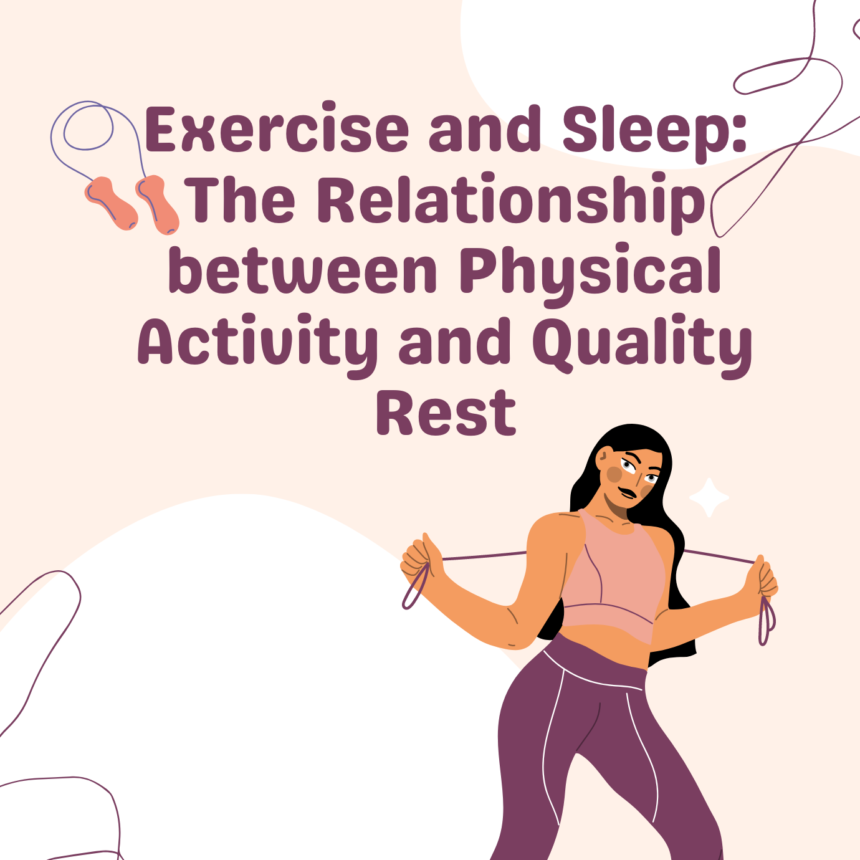Exercise and sleep have a close and interconnected relationship. Regular physical activity can positively influence the quality and duration of sleep, while sufficient sleep enhances exercise performance and recovery. Here’s how exercise and sleep are related:
1. Improved Sleep Quality: Engaging in regular exercise has been shown to improve sleep quality. Physical activity promotes the release of endorphins, reduces stress, and helps regulate the body’s internal clock, also known as the circadian rhythm. These factors contribute to better sleep quality, making it easier to fall asleep, stay asleep, and experience restorative sleep.
2. Increased Sleep Duration: Exercise can help increase the total duration of sleep. Research suggests that individuals who engage in regular physical activity tend to have longer sleep durations compared to those who are sedentary. However, it’s important to note that the timing and intensity of exercise can affect sleep duration. Vigorous exercise close to bedtime may increase alertness and make it more difficult to fall asleep, so it’s generally recommended to complete exercise at least a few hours before bedtime.
3. Enhanced Sleep Efficiency: Sleep efficiency refers to the percentage of time spent in bed that is actually spent asleep. Regular exercise has been associated with improved sleep efficiency, meaning that individuals who exercise regularly spend a higher proportion of their time in bed asleep compared to those who are less physically active.
4. Sleep Onset and Sleep Latency: Exercise can reduce the time it takes to fall asleep, also known as sleep onset or sleep latency. Physical activity helps tire the body, increases feelings of sleepiness, and can help individuals fall asleep more quickly.
5. Regulation of Circadian Rhythm: Regular exercise can help regulate the body’s internal clock, known as the circadian rhythm. By exposing the body to natural light during the day and engaging in physical activity, the circadian rhythm is better aligned, leading to improved sleep-wake patterns and overall sleep quality.
6. Sleep and Exercise Performance: Quality sleep plays a critical role in exercise performance and recovery. During sleep, the body repairs and rebuilds tissues, releases growth hormones, and consolidates memories and learning. Sufficient sleep enhances energy levels, cognitive function, muscle recovery, and overall physical performance during exercise.
7. Exercise Timing and Sleep: The timing of exercise can impact sleep. Some individuals may find that exercising too close to bedtime can increase alertness and make it difficult to fall asleep. It’s generally recommended to complete exercise at least a few hours before bedtime to allow the body and mind to wind down and prepare for sleep.
8. Individual Differences: The relationship between exercise and sleep can vary among individuals. Some people may find that exercise has an immediate positive impact on their sleep, while others may require a longer period of regular exercise before experiencing improvements in sleep quality. It’s important to pay attention to your own body and adjust your exercise routine and timing based on your personal sleep patterns and preferences.
9. Consistency and Routine: Regular exercise and consistent sleep routines go hand in hand. Establishing a consistent exercise routine and sleep schedule can help regulate your body’s natural sleep-wake cycle and improve overall sleep quality.
10. Listen to Your Body: It’s important to listen to your body’s cues and find the exercise and sleep routine that works best for you. Pay attention to how different types of exercise and timing of exercise affect your sleep patterns. If you have any underlying health conditions or concerns, it’s always a good idea to consult with a healthcare professional.
By incorporating regular exercise into your routine, maintaining a consistent sleep schedule, and prioritizing good sleep hygiene practices, you can create a positive cycle of exercise and sleep that supports your overall well-being and promotes optimal physical and mental performance.
